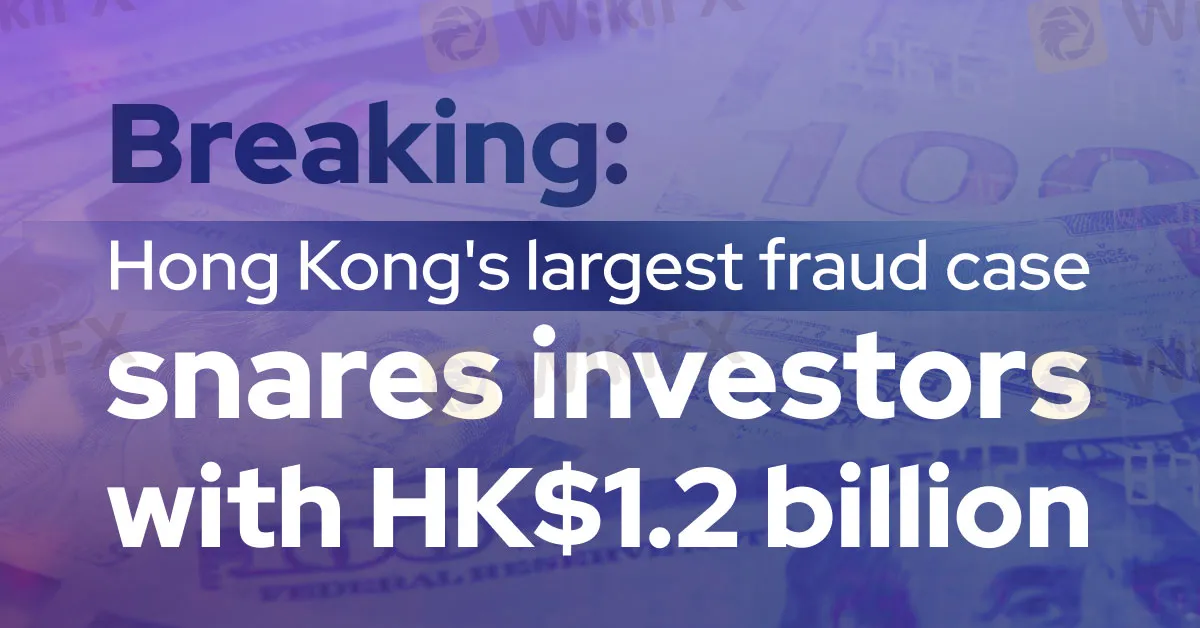简体中文
繁體中文
English
Pусский
日本語
ภาษาไทย
Tiếng Việt
Bahasa Indonesia
Español
हिन्दी
Filippiiniläinen
Français
Deutsch
Português
Türkçe
한국어
العربية
Breaking: Hong Kong's largest fraud case snares investors with HK$1.2 billion
Abstract:The Hong Kong Securities and Futures Commission (SFC) issued a stern warning to JPEX, highlighting false advertising practices and the absence of proper licensing. This article delves into the JPEX scandal, its implications, and the broader context of cryptocurrency regulation in Hong Kong.

In recent years, JPEX, a virtual asset trading platform, has gained immense popularity in Hong Kong. However, a series of alarming events have raised concerns about the platform's legitimacy and user protection. Reports of users being unable to withdraw funds, drastic withdrawal limits, and exorbitant fees have sent shockwaves through the cryptocurrency community. On September 13, the Hong Kong Securities and Futures Commission (SFC) issued a stern warning to JPEX, highlighting false advertising practices and the absence of proper licensing.
JPEXs Marketing Strategies in HK
JPEX's aggressive marketing strategies added fuel to the controversy. The platform inundated television screens, outdoor advertising spaces, and bus station lightboxes with advertisements, creating a significant presence in Hong Kong's media landscape.
The SFC's Warning
The Hong Kong Securities and Futures Commission (SFC) issued a specific warning to JPEX regarding false and misleading advertising tactics, often involving online celebrities (Kols) and Over-The-Counter (OTC) exchange shops. Importantly, the SFC clarified that none of the entities under the JPEX Group possessed the necessary licensing to operate a virtual asset trading platform in Hong Kong. In response, the SFC took action by informing influencers and off-site swap shops of their concerns and suspicions, urging them to cease promoting JPEX and its services.
Shutdown
On September 18, JPEX announced the removal of all transactions from its financial management page, citing unlicensed operations as the reason. This abrupt decision left users in a state of uncertainty and raised further questions about the platform's authenticity.
The Arrest of Joseph Lam Chok
Adding to the intrigue of the JPEX scandal was the arrest of Joseph Lam Chok, a Hong Kong Internet celebrity who publicly claimed to be seeking a partnership with JPEX. Lam's arrest occurred in the wake of the controversy, as the Commercial Crime Bureau of the Hong Kong police executed a search warrant at his office, seizing boxes of potential evidence. Joseph Lam Chok's notoriety stemmed from his lavish lifestyle and numerous scandals, making him a controversial figure in the online celebrity world.
Hong Kong's largest fraud case
The financial ramifications of the JPEX scandal are significant, with more than 1,600 investors affected, resulting in losses amounting to HK$1.2 billion (US$154 million). This makes it the largest financial fraud case in Hong Kong's history. The incident underscores the risks faced by local retail investors in the fast-growing world of cryptocurrencies, despite the government's efforts to transform Hong Kong into a virtual asset hub.
Conclusion
The JPEX incident highlights the critical importance of cryptocurrency regulation and the need for individuals to exercise caution when investing in virtual assets. The JPEX scandal serves as a stark reminder of the risks and challenges associated with the cryptocurrency industry. It emphasizes the vital role of regulatory bodies in protecting investors and maintaining the integrity of financial markets. As Hong Kong navigates this crisis, it faces a crucial test in its pursuit of becoming a global fintech hub while ensuring the safety and security of its investors in the virtual asset space.

Disclaimer:
The views in this article only represent the author's personal views, and do not constitute investment advice on this platform. This platform does not guarantee the accuracy, completeness and timeliness of the information in the article, and will not be liable for any loss caused by the use of or reliance on the information in the article.
Read more

Bank Negara Malaysia Flags 12 New Companies for Unauthorised Activity
Bank Negara Malaysia (BNM) has updated its Financial Consumer Alert List (FCA List) by adding 12 more entities, reinforcing its efforts to warn the public against unregulated financial schemes. Check if your broker made the list!

TradingView Brings Live Market Charts to Telegram Users with New Mini App
TradingView has launched a mini app on Telegram, making it easier for users to track market trends, check price movements, and share charts.

Bybit Shuts Down NFT Marketplace Amid Crypto Market Downturn
Bybit announces the closure of its NFT marketplace, citing efforts to streamline offerings. Discover the latest trends in the declining NFT market and its shift to utility-based growth.

March Oil Production Declines: How Is the Market Reacting?
Oil production cuts in March are reshaping the market. Traders are closely watching OPEC+ decisions and supply disruptions, which could impact prices and future production strategies.
WikiFX Broker
Latest News
Exposing the Top 5 Scam Brokers of March 2025: A Closer Look by WikiFX
Gold Prices Climb Again – Have Investors Seized the Opportunity?
Webull Launches SMSF Investment Platform with Zero Fees
Australian Regulator Warns of Money Laundering and Fraud Risks in Crypto ATMs
The Withdrawal Trap: How Scam Brokers Lure Victims into Paying More
FCA to Investors: Think Twice Before Trusting These Brokers
Trump\s tariffs: How could they affect the UK and your money
Trump gambles it all on global tariffs he\s wanted for decades
TradingView Brings Live Market Charts to Telegram Users with New Mini App
HTFX Spreads Joy During Eid Charity Event in Jakarta
Currency Calculator







